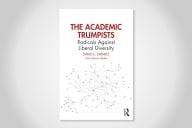You have /5 articles left.
Sign up for a free account or log in.
The Modern Language Association is among the many academic groups that have called for better treatment of those off the tenure track. The association, since 2003, has called for departments to hire adjuncts in professional ways, to provide as much job security as possible, to involve these instructors in departmental life, to provide clear information about evaluations and promotion opportunities, and so forth.
In a new effort, however, the association has completed work on a list of questions that departments can ask themselves to see if the more general guidelines are actually being applied in specific ways that would affect the quality of life of those off the tenure track.
For instance, the 2003 guidelines called on departments to make sure that compensation systems were fair and transparent, and that all instructors should have the opportunity for "a progressive career path." But the new questions being issued for departments to consider may make it more difficult for department leaders to just say, "Yes, we are progressive." The MLA is suggesting that departments ask such questions as:
- Do non-tenure-track faculty members receive raises, including merit increases, when tenure-track faculty members receive them?
- Do non-tenure-track faculty members have health and retirement benefits?
- Do non-tenure-track faculty members get paid for work they do outside of the classroom?
- Do career paths exist for those off the tenure track?
Similarly detailed questions are being offered to departments to consider on issues such as hiring (Are decisions made by committee? Are duties spelled out explicitly?); evaluations (Are there formal procedures? Do reviews go beyond student evaluations?); professional development (Are professional development activities open to adjuncts? Are there programs to recognize accomplishments by those off the tenure track?); and integration into departments (Are non-tenure-track faculty members included in online lists of faculty members? Do non-tenure-track faculty members perceive themselves as members of the department?).
The questions will be presented this week at the MLA's annual meeting, in Seattle. They were prepared by the association's Committee on Contingent Labor in the Profession.
The MLA is not asking departments for reports on their answers or issuing rankings of departments on how they answer these questions, or suggesting some minimum number of Yes answers to indicate a respectable working environment. The idea, the MLA says, is to encourage departmental reviews. The introduction to the questions states simply that "a high number of affirmative responses correspond with a high level of professionalization for members of the non-tenure-track faculty."
Maria Maisto, board chair of the New Faculty Majority (a group that advocates for non-tenure-track faculty members) and an adjunct in English at Cuyahoga Community College, praised the MLA for releasing the questions. "This is exactly the kind of direction that it needs to go," she said.
"In the past, we've had general standards without necessarily having action points," she said. Maisto said that some departments that may have agreed in theory on the need to improve the way they treat adjuncts "may have felt overwhelmed about how to evaluate their programs." The specificity of the questions the MLA is offering departments "gives them action items," she said.
Maisto said that she believed most departments would not be able to honestly answer "yes" to a majority of the questions being asked. And she said she hoped that these questions would prompt discussions on new policies and benefits. "Any department that cares about the quality of education is going to take these questions seriously," she said.







